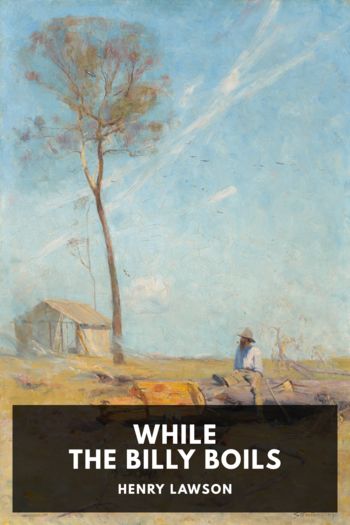While the Billy Boils, Henry Lawson [hardest books to read .txt] 📗

- Author: Henry Lawson
Book online «While the Billy Boils, Henry Lawson [hardest books to read .txt] 📗». Author Henry Lawson
The little coffin was carried out, and two gin-cases were placed by its side in the dray to serve as seats for Mrs. Martin and Mrs. Grimshaw, who mounted in tearful silence.
Pat Martin felt for his pipe, but remembered himself and mounted on the shaft. Mason fastened up the door of the hut with a padlock. A couple of blows on one of his sharp points roused Dublin from his reverie. With a lurch to the right and another to the left he started, and presently the little funeral disappeared down the road that led to the “town” and its cemetery.
About six months afterwards Tom Hopkins went on a short journey, and returned with a tall, bearded young man. He and Tom arrived after dark, and went straight to Mason’s hut. There was a light inside, but when Tom knocked there was no answer.
“Go in; don’t be afraid,’ ” he said to his companion.
The stranger pushed open the creaking door, and stood bareheaded just inside the doorway.
A billy was boiling unheeded on the fire. Mason sat at the table with his face buried in his arms.
“Father!”
There was no answer, but the flickering of the firelight made the stranger think he could detect an impatient shrug in Mason’s shoulders.
For a moment the stranger paused irresolute, and then stepping up to the table he laid his hand on Mason’s arm, and said gently:
“Father! Do you want another mate?”
But the sleeper did not—at least, not in this world.
An Echo from the Old Bark SchoolIt was the first Monday after the holidays. The children had taken their seats in the Old Bark School, and the master called out the roll as usual:—
“Arvie Aspinall.” … “ ’Es, sir.”
“David Cooper.” … “Yes, sir.”
“John Heegard.” … “Yezzer.”
“Joseph Swallow.” … “Yesser.”
“James Bullock.” … “Present.”
“Frederick Swallow.” … “Y’sir.”
“James Nowlett.” … (Chorus of “Absent.”)
“William Atkins.” … (Chorus of “Absent.”)
“Daniel Lyons.” … “Perresent, sor-r-r.”
Dan was a young immigrant, just out from the sod, and rolled his r’s like a cock-dove. His brogue was rich enough to make an Irishman laugh.
Bill was “wagging it.” His own especial chum was of the opinion that Bill was sick. The master’s opinion did not coincide, so he penned a note to William’s parents, to be delivered by the model boy of the school.
“Bertha Lambert.” … “Yes, ’air.”
“May Carey.” … “Pesin’, sair.”
“Rose Cooper.” … “Yes, sir.”
“Janet Wild.” … “Y-y-yes, s-sir.”
“Mary Wild.” …
A solemn hush fell upon the school, and presently Janet Wild threw her arms out on the desk before her, let her face fall on them, and sobbed heart-brokenly. The master saw his mistake too late; he gave his head a little half-affirmative, half-negative movement, in that pathetic old way of his; rested his head on one hand, gazed sadly at the name, and sighed.
But the galoot of the school spoilt the pathos of it all, for, during the awed silence which followed the calling of the girl’s name, he suddenly brightened up—the first time he was ever observed to do so during school hours—and said, briskly and cheerfully “Dead—sir!”
He hadn’t been able to answer a question correctly for several days.
“Children,” said the master gravely and sadly, “children, this is the first time I ever had to put ‘D’ to the name of one of my scholars. Poor Mary! she was one of my first pupils—came the first morning the school was opened. Children, I want you to be a little quieter today during play-hour, out of respect for the name of your dead schoolmate whom it has pleased the Almighty to take in her youth.”
“Please, sir,” asked the galoot, evidently encouraged by his fancied success, “please, sir, what does ‘D’ stand for?”
“Damn you for a hass!” snarled Jim Bullock between his teeth, giving the galoot a vicious dig in the side with his elbow.
The Shearing of the Cook’s DogThe dog was a little conservative mongrel poodle, with long dirty white hair all over him—longest and most over his eyes, which glistened through it like black beads. Also he seemed to have a bad liver. He always looked as if he was suffering from a sense of injury, past or to come. It did come. He used to follow the shearers up to the shed after breakfast every morning, but he couldn’t have done this for love—there was none lost between him and the men. He wasn’t an affectionate dog; it wasn’t his style. He would sit close against the shed for an hour or two, and hump himself, and sulk, and look sick, and snarl whenever the “Sheep-Ho” dog passed, or a man took notice of him. Then he’d go home. What he wanted at the shed at all was only known to himself; no one asked him to come. Perhaps he came to collect evidence against us. The cook called him “my darg,” and the men called the cook “Curry and Rice,” with “old” before it mostly.
Rice was a little, dumpy, fat man, with a round, smooth, good-humoured face, a bald head, feet wide apart, and a big blue cotton apron. He had been a ship’s cook. He didn’t look so much out of place in the hut as the hut did round him. To a man with a vivid imagination, if he regarded the cook dreamily for a while, the floor might seem to roll gently like the deck of a ship, and mast, rigging, and cuddy rise mistily in the background. Curry might have dreamed of the cook’s galley at times, but he never mentioned it. He ought to have been at sea, or comfortably dead and stowed away under ground, instead of cooking for a mob of unredeemed rouseabouts in an uncivilized shed in the scrub, six hundred miles from the ocean.
They chyacked the cook occasionally, and grumbled—or pretended to grumble—about their tucker, and then he’d make a roughly pathetic speech, with many references to his age, and the hardness of his work, and the smallness of his wages, and the inconsiderateness of





Comments (0)